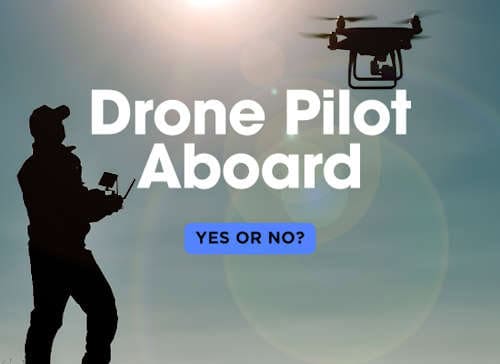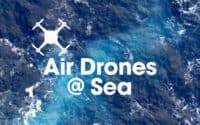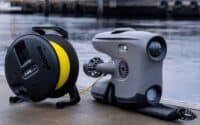Drone Pilot Aboard: Yes or No?

Drones have revolutionized the maritime industry by offering an efficient and safe way to carry out a wide range of tasks on board ships. Aerial drones (also known as UAVs) are increasingly used for inspections, surveillance, cargo monitoring, and even environmental compliance. Underwater drones (ROVs) offer significant advantages in underwater inspections, such as checking hull integrity, inspecting ballast tanks, and exploring seabeds. The integration of drones into maritime operations can improve safety, reduce costs, and optimize efficiency.
So, should a full time drone pilot be aboard? Let’s find out.
| ShipUniverse: Aerial Drone Uses and Benefits on Ships | ||
| Use Case | What It Is | Benefits |
| Ship Hull Inspections | Aerial drones perform detailed inspections of a ship’s hull, especially in areas difficult to reach without cranes or scaffolding. | Reduces the need for scaffolding and climbing, improves safety, speeds up inspections, and identifies potential damage early. |
| Cargo Monitoring | Using drones to monitor loading/unloading processes and cargo integrity during operations. | Provides real-time footage to ensure proper cargo handling, reducing human error and delays in port operations. |
| Surveillance and Anti-Piracy | Drones are used to patrol the area around the ship, providing early warnings of suspicious activity or pirate threats. | Enhances onboard security, extends visual range beyond the ship, and allows rapid response to potential threats. |
| Environmental Monitoring | Drones equipped with sensors monitor emissions and water quality, ensuring compliance with environmental regulations. | Improves environmental compliance and helps avoid fines for emissions violations or marine pollution. |
| Search and Rescue Operations | Drones can be deployed to locate missing crew members or passengers at sea, covering large areas quickly. | Speeds up search operations, reducing response times and increasing the chances of successful rescues. |
| Port Scouting and Navigation Assistance | Drones can scope out port entry points, assess docking areas, and check for traffic congestion or obstructions near port facilities. | Improves situational awareness, reduces the risk of accidents during docking, and enhances the efficiency of port operations. |
| Ocean Obstruction Detection | Aerial drones help identify floating debris, icebergs, or other potential hazards that could damage the ship’s hull or propellers. | Enhances navigation safety by providing early warnings about potential obstacles in the ship’s path. |
| Communication Relay | Drones can act as communication relays between a ship and onshore operations when out of range of traditional communication networks. | Improves communication in remote areas, particularly during long-range voyages or emergency situations. |
| Weather Monitoring | Drones equipped with weather sensors can collect data on storm conditions, wind patterns, and sea state, providing real-time weather updates. | Allows ships to navigate more safely by avoiding bad weather or adjusting course to minimize risk. |
| ShipUniverse: Underwater Drone Uses and Benefits on Ships | ||
| Use Case | What It Is | Benefits |
| Hull and Propeller Inspections | ROVs (underwater drones) are used to inspect the underwater portion of a ship’s hull, propellers, and rudders for damage or fouling. | Reduces the need for costly dry-docking, allows real-time underwater inspections, and identifies issues that affect fuel efficiency. |
| Ballast Tank Inspections | Underwater drones can inspect ballast tanks for corrosion, cracks, or structural integrity without draining the tanks. | Increases safety by reducing the need for human entry into confined spaces, speeds up inspections, and provides detailed footage. |
| Underwater Structure and Seabed Mapping | ROVs can map underwater structures and seabeds to assess anchorages, seabed conditions, and underwater hazards. | Improves navigational safety by providing accurate data on seabed conditions, ideal for anchoring or seabed construction. |
| Environmental Monitoring | Underwater drones can monitor water quality, check for pollution, and assess the impact of shipping activities on marine ecosystems. | Helps ensure compliance with environmental regulations and reduces the ship’s environmental impact. |
| Salvage Operations | ROVs are used in salvage operations to assess sunken ships or cargo, and plan recovery missions. | Improves safety in hazardous underwater conditions, provides detailed visuals for salvage planning, and reduces human risks. |
Hiring vs Training
As drones become an essential tool in maritime operations, shipowners face a crucial decision: Should they hire a dedicated drone pilot or train an existing crew member to operate the drone? Both options have advantages and challenges, and the decision depends on factors such as cost, expertise, and operational requirements. Below is a detailed comparison to help fleet managers decide which option best suits their needs.
| ShipUniverse: Hiring a Full-Time Drone Pilot | ||
| Aspect | Details | Pros & Cons |
| Expertise | A dedicated drone pilot will have specialized skills and experience, making them highly efficient in handling complex operations, inspections, aerial mapping, and troubleshooting. | Pros: Access to advanced skills and expertise, resulting in high-quality data and faster execution.
Cons: May require higher pay due to the specialized skill set. |
| Focus | Since the primary responsibility of a full-time drone pilot is drone operations, they are fully focused on this task without being distracted by other responsibilities aboard the ship. | Pros: Higher operational efficiency and more precise results.
Cons: Limited flexibility as the pilot is focused solely on drone operations. |
| Advanced Operations | A professional drone pilot can handle advanced drone tasks such as environmental monitoring, complex aerial inspections, and high-detail imaging. | Pros: Can execute complex tasks that require a high level of precision and knowledge.
Cons: May be underutilized if the ship only needs basic drone operations. |
| Compliance | A licensed drone pilot ensures that the ship adheres to local and international regulations governing the use of drones, reducing the risk of fines or legal issues. | Pros: Ensures all drone operations meet regulatory requirements, lowering the risk of non-compliance penalties.
Cons: Ongoing costs for keeping certifications and training up to date. |
| Cost | Hiring a full-time drone pilot typically involves a higher upfront cost, including salary, benefits, and potential relocation fees. | Pros: Long-term investment in high-quality drone operations.
Cons: Expensive option, especially for smaller fleets or those that do not need drones regularly. |
| Efficiency | A professional drone pilot, dedicated to the role, will likely complete tasks more quickly and accurately than a less experienced crew member. | Pros: High efficiency, reduces downtime for inspections and other drone operations.
Cons: Limited to drone-related tasks, so may not be useful when drone operations are minimal. |
| Dependency | Relying on one person for all drone operations can create issues if the pilot is unavailable due to leave, illness, or other reasons. | Pros: Dedicated, reliable expertise available when needed.
Cons: Operational disruption if the pilot is unavailable, leading to a potential reliance on backup solutions. |
| ShipUniverse: Training an Existing Crew Member for Drone Operations | ||
| Aspect | Details | Pros & Cons |
| Cost-Effectiveness | Training an existing crew member can be a more affordable option compared to hiring a full-time drone pilot, as it eliminates recruitment costs and offers flexibility. | Pros: Saves on recruitment, salary, and benefits for a new hire.
Cons: Initial training, certification, and potential licensing fees can still add up. |
| Flexibility | The crew member can perform drone operations alongside other responsibilities on the ship, making them a versatile asset. | Pros: Versatile role, allowing the crew member to contribute to other ship tasks when not using the drone.
Cons: May lead to split focus, causing slower drone operations or lower priority for drone-related tasks. |
| Familiarity with Ship Operations | Training a current crew member means they already understand the ship’s systems, routes, and operations, leading to smoother integration of drone tasks into daily routines. | Pros: Easier to train someone who is already familiar with the ship’s layout and operations.
Cons: Limited specialized knowledge about drones, which could affect complex operations. |
| Expertise | While crew members can be trained in basic drone operations, they may lack the specialized knowledge and skills that a full-time professional drone pilot possesses. | Pros: Good for basic drone tasks like simple inspections or photography.
Cons: Less effective for advanced tasks such as detailed environmental monitoring or complex mapping operations. |
| Training Costs and Time | Training an employee requires both initial investment in their certification and ongoing education to keep their skills up-to-date. | Pros: One-time training costs that pay off over time.
Cons: Time-consuming and could lead to periods of unavailability during the training process. |
| Compliance | The crew member must undergo the necessary certifications and training to ensure they comply with local and international drone regulations. | Pros: Easier to maintain ongoing compliance once certified.
Cons: Ongoing costs to ensure the crew member is compliant with evolving regulations and certification renewals. |
| Operational Efficiency | Since the crew member will have other responsibilities, drone operations may not always be a top priority, leading to reduced operational efficiency when it comes to time-sensitive drone tasks. | Pros: More cost-effective when drones are used occasionally.
Cons: Lower efficiency if the crew member’s attention is divided between drone tasks and other duties. |
Key Considerations
1. Budget 💰
- Hiring: A full-time drone pilot typically comes with higher upfront costs due to salary, benefits, and possibly relocation expenses. However, this investment may be worthwhile if drones are used frequently and require specialized expertise.
- Training: Training an existing crew member is generally more budget-friendly in the short term, as you save on recruitment and additional salaries. However, there are still costs for initial certification and ongoing education.
- Consider: Evaluate how often the drone will be used and whether the additional salary of a full-time pilot is justified. If drone usage is occasional, training an existing crew member might be more cost-effective.
2. Operational Efficiency ⏱️
- Hiring: A dedicated drone pilot will typically be more efficient at completing drone tasks quickly and accurately, as this is their primary focus. This option is ideal for ships that require frequent drone operations.
- Training: While a trained crew member can perform drone operations, their efficiency may be lower if they are juggling other duties aboard the ship. This could lead to slower response times for drone-related tasks.
- Consider: If speed and precision are essential for drone operations (e.g., for regular inspections or surveillance), a full-time pilot may be the better option. Otherwise, a crew member might suffice for less frequent tasks.
3. Expertise 🎓
- Hiring: A full-time drone pilot brings specialized knowledge, which is invaluable for advanced operations like complex inspections, environmental monitoring, or detailed mapping.
- Training: A crew member trained to operate drones will likely have basic knowledge but may lack the advanced skills required for more complex drone tasks.
- Consider: If your ship requires advanced drone capabilities, such as high-level inspections or real-time analytics, hiring a professional pilot ensures that the job is done at the highest standard.
4. Long-Term Flexibility 🔄
- Hiring: A full-time drone pilot is typically specialized and may have limited flexibility in taking on other roles aboard the ship. Their primary focus will be drone-related tasks.
- Training: A trained crew member can be more versatile, taking on multiple responsibilities aboard the ship beyond drone operations, making them a more flexible asset.
- Consider: If flexibility is crucial to your operation, and you want the crew member to contribute to other duties, training someone already on board may offer more value.
5. Compliance and Regulation 📜
- Hiring: A licensed drone pilot will have up-to-date knowledge of all relevant regulations, ensuring that all operations are compliant with local and international laws.
- Training: A crew member will need to be trained and licensed to meet compliance standards, and you’ll need to keep them updated on any regulatory changes, which may require ongoing education.
- Consider: If compliance with drone regulations is critical in your operating regions, ensure that the chosen option includes regular updates on laws and certification renewals.
6. Drone Usage Frequency 📅
- Hiring: For ships that use drones regularly for inspections, cargo monitoring, or surveillance, a full-time drone pilot makes sense due to the frequency of use and need for constant readiness.
- Training: If drones are used only occasionally, training a crew member will be more economical, as they can balance drone tasks with other responsibilities.
- Consider: Assess how often you will need drone operations. Regular use warrants a dedicated pilot, while occasional use can be handled by a trained crew member.
7. Long-Term Investment 📈
- Hiring: Hiring a drone pilot is a long-term investment that ensures high-quality drone operations, potentially leading to more savings over time due to increased efficiency and safety.
- Training: Training a crew member may take time to pay off, but it offers long-term savings in salaries and adds flexibility to their role.
- Consider: Consider whether the long-term value of a professional drone pilot justifies the initial costs, or if investing in a versatile crew member is more beneficial in the long run.
8. Safety and Risk Management ⚠️
- Hiring: A professional drone pilot can perform complex tasks safely, minimizing the risk of errors, accidents, or equipment damage. Their advanced skills can improve safety in inspections and surveillance.
- Training: While a trained crew member may be capable of handling basic drone operations, there is a higher risk of errors or accidents, particularly in complex or high-risk scenarios.
- Consider: If safety is a top priority, especially for challenging drone operations, a full-time drone pilot may be a safer option.

Do you have any feedback or additional insights? Please reach out to editor @ shipuniverse.com



